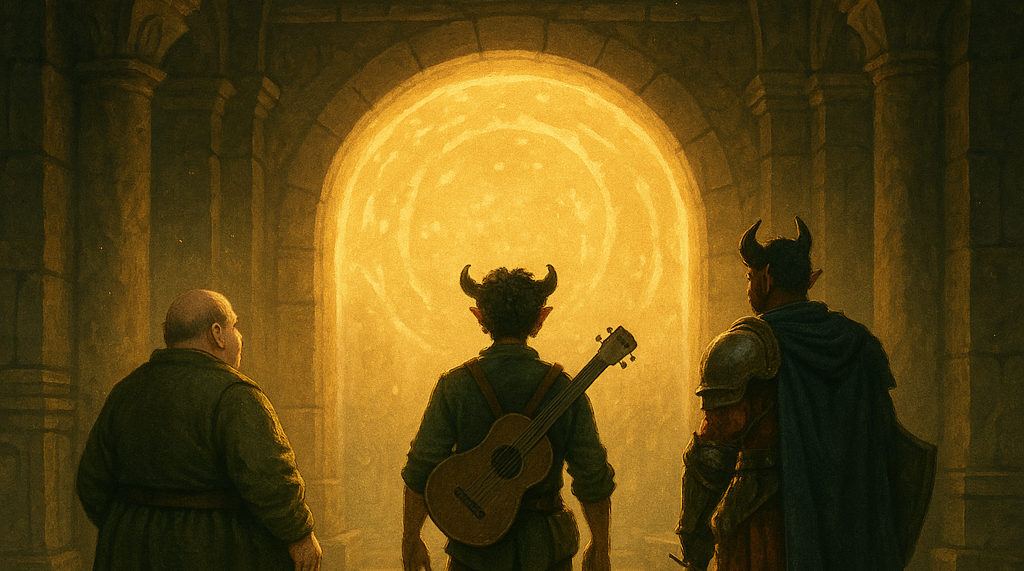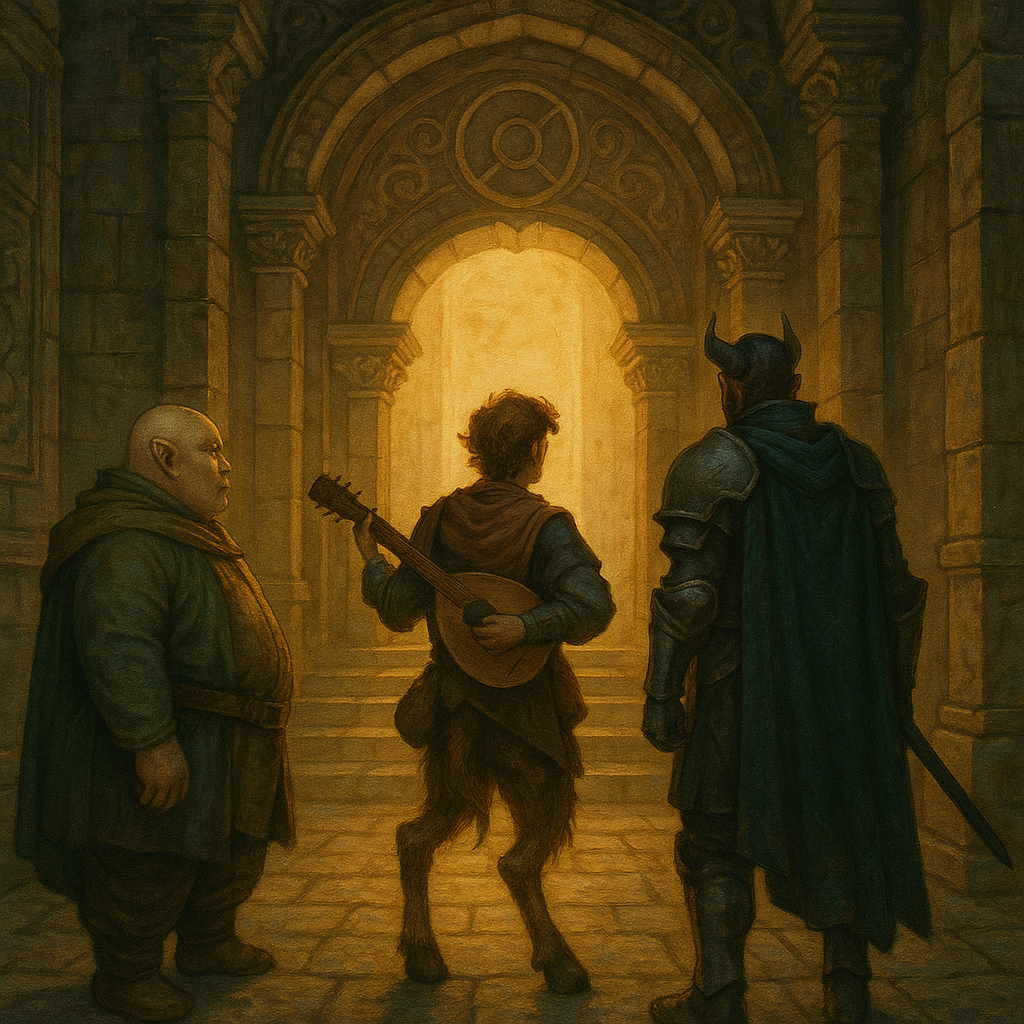Perilous Pursuit for Time: Chapter 3 – The Temple and Its Three Questions

The Whispering Mountains did not part politely. They narrowed their paths, hemmed in the companions with walls of stone that leaned like judges over guilty men, and filled the air with sighing gusts that carried words just shy of meaning. To walk there was to feel watched not by eyes but by centuries.
At last, after a punishing climb that left even Pherelar’s endless chatter ragged, the mountain opened into a bowl-shaped hollow. The hollow was ringed with stone pillars, scarred by time and streaked with moss. In its center lay nothing—emptiness arranged so deliberately that it could only be sacred.
The wind dropped into a hush, as if the mountain were drawing in its breath to listen.
Pherelar slowed his pacing but did not stop. He felt the curse tugging, hungry, but he answered with a muttered recipe for saffron stew and a few careful stretches of his arms. “Well,” he said lightly, though sweat traced his brow, “if temples were meals, this one would be all presentation. I can’t tell if the course will be sweet or sour.”
Dorian strummed a chord, the sound bright and mocking against the solemn silence.
“A circle of stone, a riddle of air—
Step inside, if you truly dare.
But beware, my friends, for doors that are none
Open to questions you’d rather outrun.”

Jarek’s boots crunched deliberately on gravel. His hand rested on the pommel of his sword. “Enough riddles. This place tests us. Expect trials. Be ready.”
The emptiness in the center shifted. It looked at them—no other word fit—and became a door.
The Test of Strength
From the seam of the air stepped a figure that might once have been a statue but had chosen, after centuries of patience, to walk. Shoulders like quarries, chest like a wall, head horned like a ram and heavy as a stormcloud. Dust rolled from its body with every movement.
“I am Burdek,” the figure intoned, voice the grinding of slate against slate. “Show me you do not scatter.”
Jarek moved forward without hesitation. He removed his gauntlets and set them carefully aside, as though preparing for prayer. “Strength is not breaking,” he said. “It is bearing.”
“Show me,” Burdek answered.
The ground itself drew a circle for them, gravel sliding away, wind pressing into boundaries. Dorian sat at the rim and began to strum a low, steady beat, his eyes wide but determined. Pherelar paced like a caged animal, whispering counts, watching every move with restless intensity.
Burdek struck first—an arm descending like a hammer made of mountain. Jarek braced, shield raised. The impact rang like a bell, echoing through the bowl. Dust exploded. Jarek staggered but did not fall.
Burdek pressed forward, blows raining like judgments, each one designed to end a man. Jarek absorbed them, turned them, yielded when he must, advanced when he could. His oaths burned in his chest: to endure, to hold, to stand where others fell.
Once, Burdek’s strike drove Jarek to one knee. The guardian’s basalt fist hovered over his brow, shadow falling like night. Jarek’s spine straightened, unbroken. “I do not break,” he said evenly. “I bear.”
The fist stopped. The guardian’s massive head dipped in recognition. “Enough,” Burdek said. “You are no hammer—you are a hinge. You open where others shatter. Pass.”
The circle dissolved. Burdek stepped back into the seam of the world, and the silence that followed was approving.
The Test of Wisdom
Before Pherelar could even exhale, the air rippled. His vision blurred. When it cleared, he was no longer in the mountain bowl.
He stood once again in the lecture hall of Aerlune. The smell of lamp oil, parchment, and sweet buns filled his senses. Students bent over notes, scratching furiously. At the back of the hall, the sorcerer sat silent, hands folded, eyes bright with hunger.
The curse had not been cast.
Pherelar froze. Sweat prickled the back of his neck. This is the test, he thought. Wisdom is a choice, not an outcome.
He considered. If he attacked the sorcerer now, he might end the threat before it began. If he begged, bargained, pleaded—perhaps he could rewrite the future. Or he could do nothing, and perhaps avoid the curse altogether.
But doing nothing was the one thing forbidden to him. He almost laughed.
So he did what came most naturally to him. He taught.
He lifted the chalk and began to draw—not brittle lines of diagrams this time, but loops and swirls, stories captured in symbols. He spoke not as a lecturer but as a traveler who had tasted many truths. He told them time was not a chain, nor a wheel, nor a river, but a kitchen, a garden, a song. He told of soup spoiled when neglected, gardens ruined by over-pruning, songs that collapsed when sung too quickly. He spoke of balance, of care, of living seconds as though they were ingredients to be savored.
The sorcerer did not move. He listened, as silent as the hunger in his eyes.
Pherelar’s voice grew stronger, animated by the countless markets and monasteries and seas he had crossed. “Fear is wasteful,” he said. “Respect—ah, that is the true seasoning. And motion is not compulsion—it is devotion. Attend to your hours, and they will attend to you.”
The chalk snapped in his hand. He stopped.
The hall was empty. The students gone. Only one word remained, scrawled across the board in a hand not his own:
Proceed.
Pherelar blinked, heart hammering, and the mountain bowl returned around him. His calves ached from the pacing he had not ceased. His lips tasted of chalk dust and salt.
Dorian clapped him on the back, eyes shining. “A fine sermon, Pher. The kind that turns even silence into applause.”
Jarek gave the smallest of nods. “Second test passed.”
The Test of Heart
The emptiness at the bowl’s center stirred once more. Wind rose, catching sand, lifting syllables. The air shaped itself into a figure of movement—seen only where it disturbed, heard only where it whispered.
“Heart is attention,” the wind said, with the quiet cruelty of truths that seem simple. “Choose.”
Sand swirled. Two images formed, cruel in their clarity.
To one side: a child kneeling at a dried streambed, cupping dust in cracked palms and whispering that it was water. His lips were split, his eyes wide with desperate hope.
To the other: a woman pinned beneath a fallen beam in a burning house, her eyes calm, her mouth forming prayers. She did not scream. She waited only for the fire’s decision.
“Only one may be saved,” the wind said. “Choose with your heart.”
The companions froze.
Dorian’s strings groaned into a minor chord, mournful.
“One life, two lives, the measure is cruel—
The scale is a liar, the test a foul rule.”
“Decide,” Jarek said, voice heavy. “Indecision kills more surely than wrong choice.” His hand hovered near his sword, though he knew steel could not solve this.
Pherelar’s breath caught. His legs pulled him one way, then the other, nearly buckling. The curse yanked eagerly at his hesitation, tasting weakness. His mind screamed that he must choose—that to save one was still salvation, while to try for both was to fail both.
And yet…
“No,” Pherelar whispered, then louder: “No! Time is not a ration to be divided. It is a banquet, and no guest is turned away.”
He ran toward the child. His silver net flared, catching dust, twisting it into rain for the space of a heartbeat. He did not stop. He sprinted through, cloak wet, carrying droplets like stolen treasures.
He burst into the burning house. Steam rose from his cloak, blossoming into a cloud. He made the cloud into a shout, the shout into hands—dozens of shimmering echoes of himself, all moving because he refused to stand still. Together, they lifted the beam. The woman gasped, scrambled free, and staggered into the light.
Both were saved.
The wind stilled, utterly silent. Then it laughed—an astonished laugh, like sheets snapping on a line. “Very well,” it said, voice carrying both amusement and respect. “Your heart is not a knife, but a loom. You weave where others cut. Pass.”
The visions dissolved. The sand settled. And in the bowl’s center, where emptiness had been, there now flowed a spring. No glittering chalice, no jewel, no holy flame—just water, spilling from rock into a basin, clear and unassuming. The air smelled faintly of rain and possibility.
Dorian lowered his guitar, trembling with the effort not to drink. Jarek inhaled deeply, the iron of his discipline warring with the pine-scented promise of relief.
Pherelar stepped forward, eyes wide. “Simple, clean, honest,” he murmured. “The best dishes are always the simplest.” His hand reached toward the water. And as it did, the shadow that had cursed him slid out of his reaching hand.
Links to the chapters in the story:
- Perilous Pursuit for Time: Prologue – The Hour the World Slipped
- Perilous Pursuit for Time: Chapter 1 – Companions in Motion
- Perilous Pursuit for Time: Chapter 2 – The Road That Refuses to End
- Perilous Pursuit for Time: Chapter 3 – The Temple and Its Three Questions
- Perilous Pursuit for Time: Chapter 4 – The Sorcerer Who Collected Seconds
- Perilous Pursuit for Time: Chapter 5 – The Elixir and the Decision
- Perilous Pursuit for Time: Post Script
👁️ 324 views


2 Comments on “Perilous Pursuit for Time: Chapter 3 – The Temple and Its Three Questions”
When are you releasing your book
Soon. 🙂